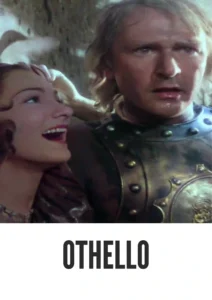Contact: [email protected]
Video Sources 0 Views
- Watch trailer
- Othello


Synopsis
Table of Contents
ToggleReview: Othello (1951) – A Captivating Adaptation of Shakespeare’s Tragic Masterpiece

Introduction
Othello, released in 1951, stands as a timeless cinematic adaptation of William Shakespeare’s tragic play. Directed and produced by Orson Welles, this film brings to life the tale of jealousy, betrayal, and manipulation with unparalleled depth and intensity. In this review, we’ll explore the enduring legacy of Othello and its contribution to the realm of Shakespearean adaptations.
Check The Full Colorized Movies List
Check Our Colorized Movies Trailer Channel
Understanding Othello (1951): Director, Cast, and Genre
Directed and produced by Orson Welles, Othello features a stellar cast including Welles himself as Othello, Suzanne Cloutier as Desdemona, and Micheál MacLiammóir as Iago. The film falls within the genre of historical drama, known for its exploration of timeless themes and complex characters.
Exploring the World of Othello (1951): Plot and Characters
Othello follows the tragic downfall of the noble Moorish general Othello, whose life is torn apart by jealousy and deception. Manipulated by the villainous Iago, Othello’s love for his wife Desdemona is poisoned by suspicion, ultimately leading to a series of devastating consequences. As the story unfolds, the audience is drawn into a world of passion, intrigue, and betrayal, where love and loyalty are put to the ultimate test.
The Art of Film Colorization
While Othello was originally filmed in black and white, its early colorized version adds a new layer of visual richness and vibrancy to its sweeping landscapes and evocative cinematography. The colorization process enhances the film’s dramatic impact and captures the emotional depth of Shakespeare’s timeless tale with stunning visual clarity.
Early Colored Films: A Brief History
The history of early colored films is marked by innovation and experimentation as filmmakers sought to enhance the visual appeal of their movies. From hand-tinted frames to pioneering technicolor processes, the evolution of colorization techniques transformed the cinematic landscape, offering audiences a new way to experience classic stories and timeless themes.
Othello (1951) and Its Early Colored Version
The decision to release Othello in a colorized format was made with the intention of immersing audiences in the vibrant world of Shakespeare’s tragic masterpiece. While some purists may prefer the original black and white version, the early colorized edition of the film adds a new dimension to its storytelling and captures the emotional intensity of the characters’ struggles with stunning visual impact.
The Debate Over Film Colorization
The debate over film colorization continues to divide audiences and industry professionals alike. While some argue that colorization breathes new life into classic films and makes them more accessible to modern audiences, others maintain that it compromises the artistic integrity of the original work. As technology advances and filmmaking techniques evolve, the debate over colorization remains a topic of ongoing discussion within the film community.
Examining Othello (1951) as an Early Colored Film
Viewing Othello in its early colorized iteration offers audiences a fresh perspective on Shakespeare’s timeless tale of love, jealousy, and betrayal. The colorization process enhances the film’s visual impact and captures the emotional depth of the characters’ struggles with stunning visual clarity. As Othello’s descent into madness is brought to life in vivid detail, the audience is drawn into a world of passion and tragedy that resonates with timeless relevance.
Influence and Legacy: Othello (1951)’s Impact on Cinema
Othello is widely regarded as a cinematic masterpiece that remains faithful to Shakespeare’s original vision while offering a fresh interpretation of the timeless tale. Its evocative cinematography, powerhouse performances, and haunting score have inspired generations of filmmakers and theatergoers alike, cementing its status as one of the greatest Shakespearean adaptations of all time. As a testament to its enduring relevance, Othello continues to captivate audiences with its timeless themes and unforgettable characters.
Director’s Cinematic Legacy: Beyond Othello (1951)
Orson Welles’ directorial legacy extends far beyond Othello, encompassing a diverse body of work that spans multiple genres and mediums. As a filmmaker, Welles was known for his bold vision, innovative storytelling techniques, and uncompromising dedication to his craft. Othello stands as a testament to his talent and creativity, solidifying his reputation as one of the greatest directors of the 20th century.
Themes Explored in Othello (1951)
At its core, Othello explores timeless themes of love, jealousy, betrayal, and the destructive power of suspicion. Through its evocative storytelling and rich characterizations, the film delves into the depths of the human psyche and examines the consequences of unchecked ambition and moral corruption. As Othello’s tragic flaw leads to his downfall, the audience is reminded of the fragility of love and the dangers of succumbing to jealousy and distrust.
Reception and Controversy Surrounding Othello (1951)
Upon its release, Othello received widespread critical acclaim for its stunning visuals, powerhouse performances, and faithful adaptation of Shakespeare’s text. However, the decision to release the film in a colorized format sparked debate among fans and critics alike. While some praised the colorization process for enhancing the film’s visual impact, others questioned its necessity and expressed concern about preserving the integrity of Welles’ original vision.
Where to Watch Othello (1951) Online
For those eager to experience Othello for themselves, the film is readily available on popular streaming platforms such as Amazon Prime Video, Google Play Movies, and iTunes. Whether viewed in its original black and white format or its early colorized iteration, Othello offers a captivating and immersive cinematic experience that is sure to resonate with audiences.
FAQs About Othello (1951)
1. Is Othello based on a true story?
No, Othello is a fictionalized adaptation of William Shakespeare’s tragic play of the same name. While the characters and storyline are works of fiction, the themes of love, jealousy, and betrayal draw inspiration from real-life experiences and universal human emotions.
2. Who starred in Othello?
Othello stars Orson Welles as the titular character, the noble Moorish general whose life is torn apart by jealousy and deception. The film also features Suzanne Cloutier as Desdemona, Othello’s faithful wife, and Micheál MacLiammóir as Iago, the villainous ensign who manipulates Othello’s downfall. Their compelling performances bring depth and nuance to their respective roles, elevating the emotional resonance of the film and capturing the timeless essence of Shakespeare’s tragic masterpiece.
3. What is the central conflict of Othello?
At its core, Othello revolves around the central conflict of love versus jealousy and the destructive power of suspicion. As Othello’s love for Desdemona is poisoned by Iago’s lies and manipulation, he is consumed by jealousy and suspicion, ultimately leading to a series of tragic consequences. The film explores the consequences of unchecked ambition and moral corruption, reminding audiences of the dangers of succumbing to jealousy and distrust.
4. Why was Othello released in a colorized format?
The decision to release Othello in a colorized format was made with the intention of enhancing the film’s visual impact and capturing the vibrant beauty of its sweeping landscapes and evocative cinematography. While some purists may prefer the original black and white version, the early colorized edition of the film adds a new dimension to its storytelling and immerses viewers in the timeless world of Shakespeare’s tragic masterpiece with stunning visual clarity.
5. What is the legacy of Othello?
Othello is widely regarded as one of the greatest Shakespearean adaptations of all time, praised for its stunning visuals, powerhouse performances, and faithful interpretation of the original text. Its enduring legacy continues to inspire filmmakers and theatergoers alike, reminding audiences of the timeless themes and universal human emotions explored in Shakespeare’s tragic masterpiece.
6. Are there any sequels or remakes of Othello?
No, there are no direct sequels or remakes of Othello. However, the film’s enduring legacy and timeless themes have inspired countless adaptations and reinterpretations across various mediums, including theater, literature, and film. As one of Shakespeare’s most revered works, Othello continues to captivate audiences with its timeless tale of love, jealousy, and betrayal.
7. Where can I watch Othello online?
For those eager to experience Othello for themselves, the film is readily available on popular streaming platforms such as Amazon Prime Video, Google Play Movies, and iTunes. Whether viewed in its original black and white format or its early colorized iteration, Othello offers a captivating and immersive cinematic experience that is sure to resonate with audiences.
Conclusion
In conclusion, Othello (1951) remains a captivating cinematic adaptation of Shakespeare’s tragic masterpiece, exploring timeless themes of love, jealousy, and betrayal with unparalleled depth and intensity. Whether viewed in its original black and white format or its early colorized iteration, Orson Welles’ classic film offers a haunting and immersive journey into the depths of the human psyche, reminding audiences of the enduring power of Shakespeare’s storytelling and the timeless relevance of his timeless themes. As viewers are drawn into the tragic tale of Othello’s downfall, they are reminded of the fragility of love and the dangers of succumbing to jealousy and distrust, making Othello an unforgettable cinematic experience that continues to resonate with audiences of all ages.













